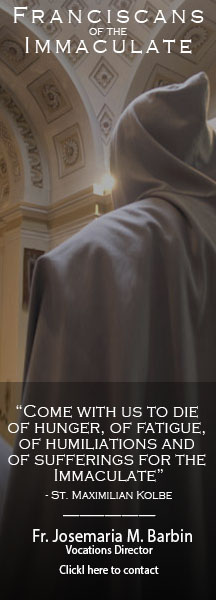As we explained in the previous article, St. Maximilian compared and contrasted great men of the world with the saints of God. While both groups of men were “high achievers,” their motives and their attitudes toward adversity were much different. Worldly glory fades and is no substitute for a life of faithfulness. Only holiness brings a happiness that can be found anywhere and at any time.
We further pointed out that while the secular hero is able to overcome many great obstacles, only the saint understands the meaning of the Cross and can find joy even in suffering, because he alone knows that sacrifice is the language of love. The real success of the saint is not a measurable achievement but fidelity in “suffering willed out of love.”
But what exactly is holiness? In an article written in 1922 for his magazine, The Knight of the Immaculate, St. Maximilian compares and contrasts the Christian vision of holiness with the counterfeits offered by other religions. There he notes that all men aspire to moral greatness. We all want to do what is right and avoid what is evil; at least that is our basic human inclination. The problem is that we are weak. Our intellects have been darkened and our wills debilitated. We have lost the integrity that we intuitively know we ought to have. In this state of confusion and debilitation, for thousands of years, man has sought after holiness without always knowing exactly what he was looking for or how to achieve it.
For men throughout the ages, whether the pagans of Greece, the philosophers and mystics of Asia, the Jews, Muslims or Christians, holiness is an exalted moral state. It has to do with what is right and good. But as St. Maximilian points out, what is right and good for each one of these religions is vastly different!
Outside the Judeo-Christian tradition, holiness was at best understood to be a divine quality, but did not include a true conception of the nature of God. Furthermore, some religious traditions even exclude the existence of a personal God, and others, while they include belief in God, do not have a concept of His fatherhood. Some traditions do not even believe in the goodness of the physical universe. Hence, in these traditions, the notion of virtue and holiness is naturalistic and false.
Even within the Jewish tradition, while there is belief in one God who personally cares for His people and who reveals His law to them, there is no clear concept of grace or redemption, unless one views the Law and the Prophets as pointing toward fulfillment in Christ Jesus. So the Jews also believe that holiness is God-likeness, but they do not understand fully what that means.
St. Maximilian says, and rightly so, that only in Christ Jesus do we learn what holiness is and how to achieve it, both because He tells us and because He shows us. The Lord spells it out for us: Be you therefore perfect, as also your heavenly Father is perfect (Mt 5:48). And Jesus, Who is the holy one of God , reveals the holiness and perfection of His Father by His obedience unto death (Jn 6:61; Phil 2:8). He tells us:If you love me, keep my commandments (Jn 14:15). And He shows this obedience and love to the whole world as He is lifted up from the earth drawing all things to Himself (cf. Jn 12:32). Jesus is the revelation of God’s holiness through His unconditional obedience and love.
Again, not only does He tell us what holiness is and how to achieve it, He shows us. The Seraphim fall down before the Cross and the Eucharist and sing “Holy, Holy, Holy.” Jesus pours Himself out for us. His obedience costs Him every last drop of His blood. On the Cross He shows us what holiness is. He wins the grace of it for us through His redeeming obedience, and He makes us holy through the blood and water flowing from His side, that is, through Baptism and the Eucharist.
St. Maximilian, the man, who had made the resolution to become the great saint, had for years meditated on what holiness meant. At the end of his life he reached his goal, because he fulfilled the words of our Lord: Greater love than this no man hath, that a man lay down his life for his friends (Jn 15:13). That love, greater than which none can be conceived, is the height of holiness because God is love (1Jn 4:8), and holiness is God-likeness.

